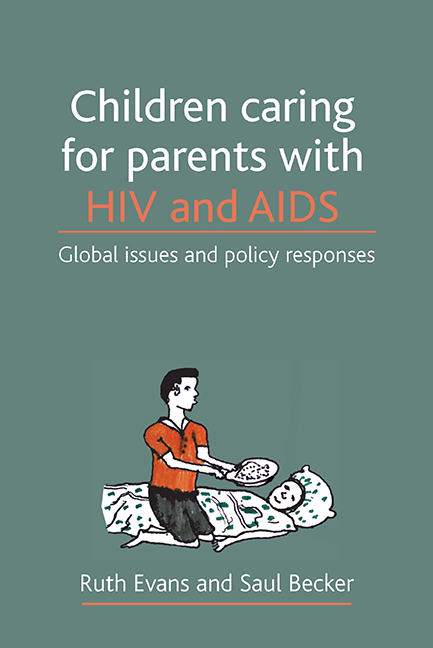Book contents
- Frontmatter
- Dedication
- Contents
- List of tables, figures and boxes
- Preface
- one Children’s and young people’s caring responsibilities within the family
- two HIV and the family
- three Reflexivity, methodology and ethics: the research process
- four Living with HIV and the effects on family life: parents’ narratives
- five Children’s and young people’s care work in households affected by HIV and AIDS
- six Resilience and impacts of care work for individual young people and their families
- seven Resilience and impacts of young people’s care work within the school and wider community
- eight The role of formal safety nets in building children’s and families’ resilience
- nine Global and local processes influencing young people’s caring roles in families affected by HIV and AIDS
- ten Responding to the support needs of children and young people caring for parents with HIV
- Bibliography
- Index
four - Living with HIV and the effects on family life: parents’ narratives
Published online by Cambridge University Press: 21 January 2022
- Frontmatter
- Dedication
- Contents
- List of tables, figures and boxes
- Preface
- one Children’s and young people’s caring responsibilities within the family
- two HIV and the family
- three Reflexivity, methodology and ethics: the research process
- four Living with HIV and the effects on family life: parents’ narratives
- five Children’s and young people’s care work in households affected by HIV and AIDS
- six Resilience and impacts of care work for individual young people and their families
- seven Resilience and impacts of young people’s care work within the school and wider community
- eight The role of formal safety nets in building children’s and families’ resilience
- nine Global and local processes influencing young people’s caring roles in families affected by HIV and AIDS
- ten Responding to the support needs of children and young people caring for parents with HIV
- Bibliography
- Index
Summary
This chapter draws on a range of theoretical concepts to interpret the everyday lived experiences of women living with HIV. Based on in-depth interviews with mothers and female relatives living with HIV in Tanzania and the UK, this chapter focuses on the effects of HIV on family life. We explore women's changing health identities over time, from discovery of their status, their embodied everyday experiences of HIV and AIDS, to secrets and disclosure within the family. We discuss changes in family relationships and the wider socioeconomic factors that intersect with HIV/AIDS at the household and community levels, including poverty and welfare support, migration, stigma and discrimination.
Embodiment, illness and disability
Social constructionist perspectives, dominant in much contemporary theorising about the body, health and disability in the social sciences, challenge the objectivity of medical knowledge about the body (Longhurst, 1997; Parr and Butler, 1999). These perspectives have been influenced by critiques of the medical model of knowledge about the body, illness and disability by feminists and disability activists (Oliver, 1990; Barnes, 1991; Morris, 1991; Longhurst, 1997). In Western societies, disability and impairments have been seen as ‘individual medical tragedies’ (Shakespeare, 1993), in which the body is conceptualised as ‘failing to meet normal standards of form, ability and mobility’ (Parr and Butler, 1999: 3). The social model of disability developed by disability theorists distinguished between impairment and disability, defining impairment as ‘the medically defined condition of a person's body/mind’ and disability as ‘the socially constructed disadvantage based upon impairment’ (Wendell, 2001: 22).
While this distinction has been crucial to the disability movement and campaigns for the civil rights of disabled people, feminists have highlighted a tendency within social model approaches to equate illness with impairment and deny the materiality of the body (Morris, 1991; Wendell, 2001). Similarly, medical sociologists and geographers have been criticised for tending to treat the body as ‘Other’ in their studies and focusing only on negative consequences and meanings associated with illness and impairment (Barnes and Mercer, 1996; Longhurst, 1997; Parr and Butler, 1999). Feminist disability theorists advocate a focus on the phenomenology of impairment that views impairments as forms of difference: ‘Knowing more about how people experience, live with and think about their own impairments could contribute to an appreciation of disability as a valuable difference from the medical norms of body and mind’ (Wendell, 2001: 23).
- Type
- Chapter
- Information
- Children Caring for Parents with HIV and AIDSGlobal Issues and Policy Responses, pp. 91 - 128Publisher: Bristol University PressPrint publication year: 2009



